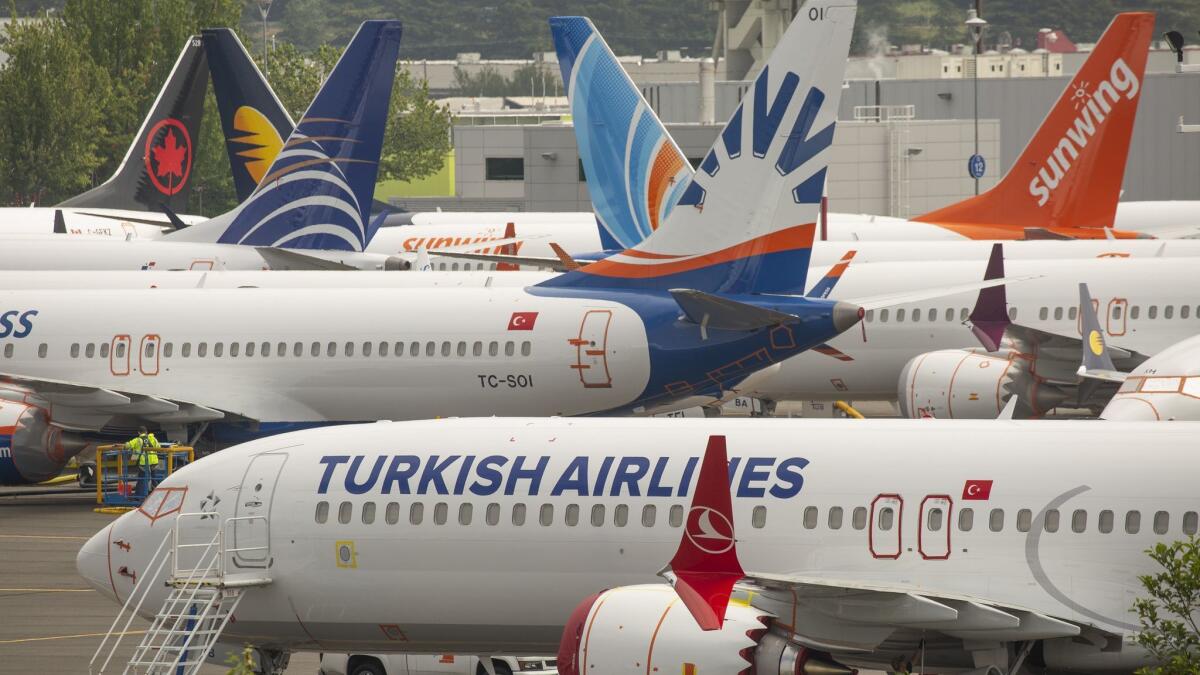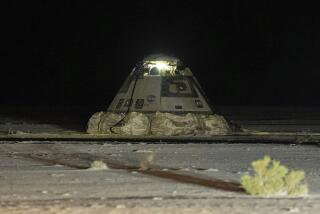Boeing CEO’s fate intertwines with 737 Max’s as key tests loom

Boeing Co. is entering a crucial month for its grounded 737 Max jetliner and its chief executive officer.
Dennis Muilenburg’s future is inextricably tied to that of the plane, which is nearing a key test with the Federal Aviation Administration amid a flying ban in its seventh month after two deadly crashes. If regulators approve the aircraft to return to the skies, Boeing’s bestselling jet must still win acceptance from flight crews and the flying public.
For Muilenburg, there’s no playbook for charting a comeback from one of the worst calamities in the history of the aerospace industry. But investors have been betting on Boeing’s resurgence in recent weeks, and any fresh setback for the company’s biggest source of profit would increase the murmurs for a leadership change.
“This is not about me, right? It’s about our company and what we do for our customers,” Muilenburg said in an interview when asked if he is the right person to lead Boeing through the crisis. “I will serve in this role with everything that I have as long as the board wants me serving in this role.”
Muilenburg, an aerospace engineer by training and Boeing lifer, has served as the planemaker’s public face throughout the Max crisis. That’s made him a target of critics who contend Boeing was too slow to fully explain the role its flight-control software played in the crashes that killed 346 people and prompted the global grounding in March.
The Max’s design and safety face renewed scrutiny after the Seattle Times and New York Times published excerpts from a whistleblower complaint filed internally by a Boeing engineer who helped design the Max’s flight controls. Boeing tumbled 2%, closing at $367.56 after the reports, amid a broad market sell-off.
In the document, later shared with U.S. Justice Department investigators, Curtis Ewbank said his managers and Michael Teal, the 737 Max’s chief project engineer, repeatedly rejected adding a safety backstop on the basis of cost and impact on pilot training. The synthetic airspeed system, used on Boeing’s 787 Dreamliner, might have counteracted a sensor that malfunctioned in both crashes.
Muilenburg will have a chance to respond publicly in an address to the Economic Club of New York later Wednesday. He also faces a grilling before the U.S. Congress on Oct. 30, a year and a day after a Lion Air jet plunged into the Java Sea off the coast of Indonesia. An Ethiopian Airlines jet fell out of the sky less than five months later.
Board message
Inside Boeing, Muilenburg is carrying out a board-ordered revamp that gives directors an unfiltered view of concerns flagged by employees, while adding initiatives of his own to sharpen the focus on safety.
The overhaul is “a very clear note that the board is paying very, very close attention and monitoring things,” said Jim Schrager, professor of entrepreneurship and strategy at the University of Chicago’s Booth School of Business.
“Dennis has, and has always had, the full, unequivocal and enthusiastic support of the Boeing board of directors,” the company’s lead outside director, David Calhoun, said in a statement.
Muilenburg has been “incredibly supportive” of the board’s new Aerospace Safety Committee, said Edmund Giambastiani, a Boeing director who will lead the oversight panel. “Dennis has the board’s confidence,” he said in an interview Sept. 25.
Boeing has taken to heart the aerospace industry’s tradition of studying tragedies for ways to make flying safer, Muilenburg said in the interview at Boeing’s Chicago headquarters. But he reiterated Boeing’s oft-repeated refrain that there was no breakdown in the design and testing of the software feature known as MCAS that was implicated in both tragedies.
A report by the U.S. National Transportation Safety Board said Boeing classified MCAS’ risk of failure as “major,” the second-lowest of four hazard assessments. In addition, the manufacturer failed to conduct simulator testing of failure modes, like a broken angle-of-attack vane, that could potentially confuse pilots with multiple alarms.
“While that accident investigation and all the work we’ve been doing has been deep and intensive, we haven’t found anything there that I would characterize as a problem or issue we’re trying to solve,” Muilenburg said. “Rather, when we look across what we’ve learned from both accidents, we always identify areas where we can improve.”
In addition to the board oversight panel, Boeing is establishing a new product and services safety organization, which will have sweeping responsibility including investigating concerns raised anonymously by employees.
The head of the new unit, Beth Pasztor, will report to the board’s safety committee as well as to Boeing’s chief engineer, Greg Hyslop. Muilenburg is also restructuring Boeing’s engineering corps. They will now report to Hyslop instead of business-unit managers.
Certification flight
Boeing is tackling the final technical work to persuade U.S. regulators to lift the grounding. Although no date has been set, the company is discussing the timing of the crucial certification flight with U.S. officials, and Muilenburg says the process is in the “endgame.” Boeing is working to clear the plane for service in the fourth quarter.
Regulatory approval would be followed by the logistical challenges of putting hundreds of airplanes back in the sky after months in storage — and eventually nursing the Max’s 600-company supply chain back to working at full speed.
Before the grounding, the 737 program generated about 35% of Boeing’s operating profit and cash flow, and 30% of the planemaker’s revenue, according to Bloomberg Intelligence estimates.
“If you’re Dennis, the program that matters absolutely the most to you beyond any other at the company is the 737,” said George Ferguson, an analyst with Bloomberg Intelligence. “You have to get that right.”
Boeing shares have rallied over the last six weeks on the first signs of the Max’s reentry into the commercial market. Since closing at $320.42 on Aug. 14, the stock had risen 17% through Tuesday, the best performance of the Dow Jones industrial average.
But the profit Boeing is able to reap from the Max ultimately will hinge on the willingness of flight crews and travelers to set aside months of deep anxiety and bruising publicity surrounding a keystone of Boeing’s future, said Schrager, the University of Chicago professor.
“The great unknown is how they fix this,” he said, “and whether the 737 goes back into the world again as one of the safest airplanes ever made.”
More to Read
Inside the business of entertainment
The Wide Shot brings you news, analysis and insights on everything from streaming wars to production — and what it all means for the future.
You may occasionally receive promotional content from the Los Angeles Times.










